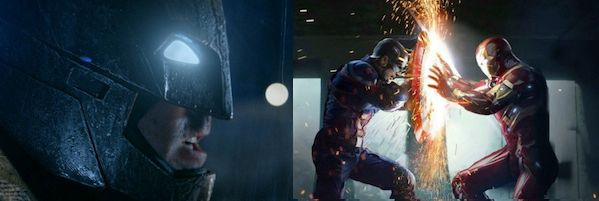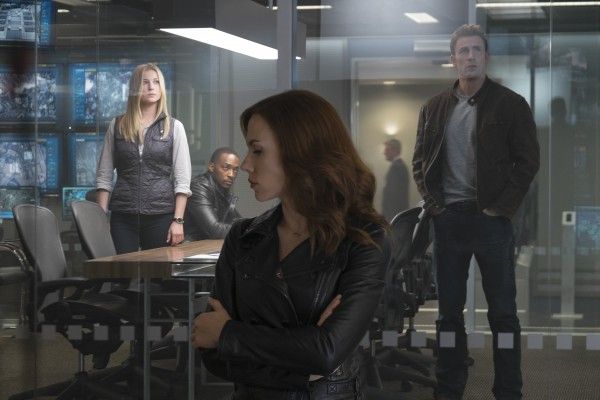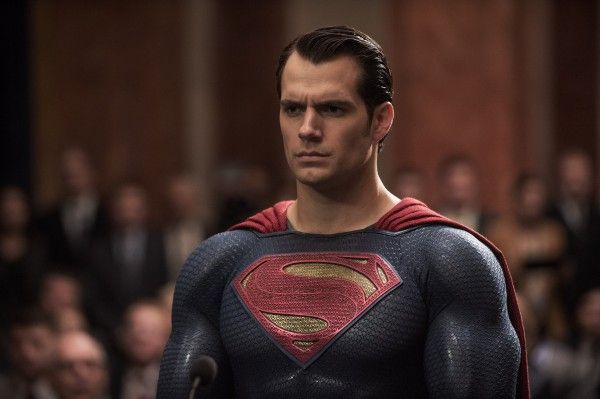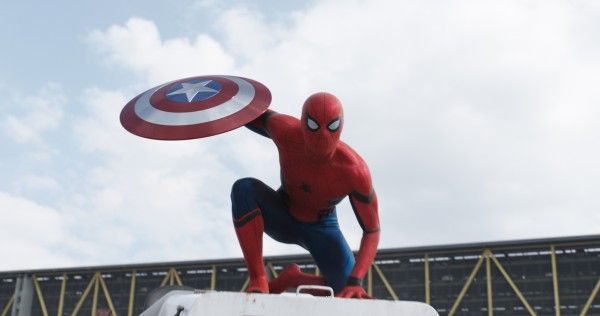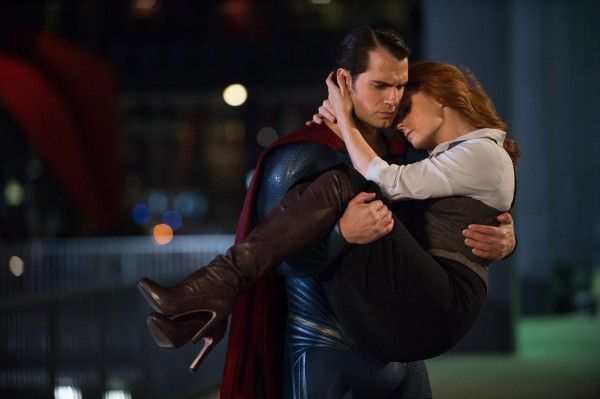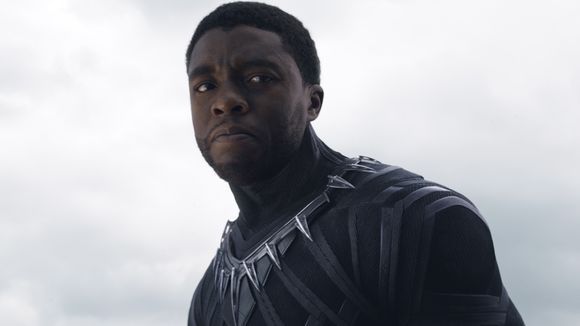Even though Captain America: Civil War has already surpassed the total box office of Batman v Superman, the Civil War of fandoms is only just starting. A wholly unfounded conspiracy theory that Disney is paying critics to trash DC films has gone from an eye-rolling comment on a social post to a mistake-filled petition on Change.org. (We refuse to gratify it with a link.) And the bickering back and forth between pro-Marvel and pro-DC fans has reached deluded sport fan levels. We've got at least four more years of this everyone, (hooray!) so can we tone down the rhetoric a little?
I get it, 2016, and the springtime in general is like an election year for superhero films. I guess I'm an Independent. Personally, I have no allegiance to either brand. In fact, the universe-building craze at studios actually hurts my allegiance to quality storytelling because the hardest part of a script or visual shot, the ending, no longer exists for a lot of films because they’re always just setting up the next step. This reduces a lot of risks and high-stake scenarios because these movies are becoming too big to fail. However, as a fan of filmmaking and not specific shields or costumes, there does appear to be a bias in audiences and critics alike to let Marvel skate past their storytelling problems. The problem is, this tendancy isn’t nefarious. Marvel Studios has made enough films over the past eights years that audiences know exactly what they’re getting and if it hits that target then people love it. DC, at least in the terms of building a cinematic universe, is so far behind the game that everything they do will be more closely scrutinized and seen as a reaction to Marvel—because it is. Every studio is reacting to Marvel. In terms of cash-outs, no one is content with sequels anymore. There’s Universal’s Monster Universe, Sony’s Men in Black and 21 Jump Street crossover, Paramount’s ramping up a Transformers universe and Fox has the X-Men.
If everyone is reacting to Marvel’s formula, then that is the level of expectation that large portions of the audience (and potentially film writers) are also measuring these works. As someone who has liked a few Marvel and DC films (and is looking forward to a few more, hey there, Suicide Squad, how do you do, Black Panther?), I have no desire to take sides. But I do think it’s strange the level of huzzahs that Civil War is receiving because ultimately, a lot of the story issues that Batman v Superman was rightfully put down for, Civil War repeated. It’s just less obvious.
Where Batman v Superman routinely has moments that grind to a halt out of director Zack Snyder’s directness, Civil War is able to glide past them because the Russo Brothers are more skilled with story flow (perhaps from their television background?). It’s apparent even in just the making of the films, where the Russos barely had any scenes that they shot that went unused, and Snyder excised entire subplots, and added new sequences while in the editing room and during the scripting stages of the follow-up film, Justice League: Part One.
Warner Brothers and DC didn’t believe that it had the time to build up its universe and instead it rushed without pouring a solid foundation. Civil War, however, is receiving heaps of praise that has more to do with the excellent foundation that they’ve set and kept upright. But if you look at the most laughable moments in Batman v Superman, you can find a similar example in Civil War, that’s better executed, sure, but only because Civil War’s story issues are more subtle.
Like Ant-Man’s fighting method, let’s start small in this critique. After Man of Steel was chastised for featuring images of skyscraper destruction that were eerily reminiscent to 9/11 in an entertainment setting, many claimed that Marvel was getting away too cleanly when their Battle of New York—though not mirroring the look of terrorist attacks—appeared to have equal destruction, without the equal uneasiness from critics and audiences because there was more effort to save others. In their newest superhero v superhero films, both DC and Marvel directly tell the audience that their major battles will lack civilian casualties. Snyder has a war room soldier announce that where Doomsday has landed is an “unoccupied” stretch of land. Audience chortles followed. However, Civil War does the same thing in the background, as an overheard speaker announces that everyone should vacate the airport. That’s a more subtle way of handling the evacuation, using a loudspeaker, but for the amount of time between that announcement and the battle, the airport does not show a hint that anyone had even visited the airport that day. Did the Langoliers clear out the airport for the Avengers? Did someone stay behind to clean up the place after the panic evacuation? This is a small grievance, but it is something that Batman v Superman gets ribbed about, and it’d be fair to equally rib Civil War, the built-in lack of civilians (despite this, both films use civilian death’s for emotional weight in their questions of superhero responsibilities. They both want it both ways.)
In regards to Doomsday, it’s a legitimate question to wonder if the creature’s third act introduction and superhero battle was necessary, but perhaps in a film that’s already overstuffed with character introductions, Doomsday was deemed necessary because he’s not a human, but a monster that knows nothing other than destruction (and because he “killed” Superman in 1993). But in introducing and defeating him in the third act, Batman v Superman quickly removes one of its seminal villains and Luthor’s introduction of the monster is rushed. Civil War begins with a heist carried out by Crossbones (Frank Grillo), a former S.H.I.E.L.D. agent who (like Scoot McNairy’s Wayne Enterprises’ employee in BvS) has embraced the terrorist route because a building was dropped on him in the previous film. Crossbones is a deadly assassin whose switch of allegiance—and for profit terrorist team assembly—in Civil War is not given any weight. He is swiftly dispatched in Civil War, even though the former Brock Runlow was introduced in the previous Captain America film; Runlow’s shift to the new Crossbones persona is not given a second thought in Civil War. He has a menacing mask, throws some thudding punches and his death puts the Avengers into a stasis period, in reaction to civilian casualties. With Doomsday and Crossbones, both BvS and the third Captain America waste villains that could’ve been big enough to menace for an entire film’s running time, simply to set up the next plot.
Let’s go slightly bigger, to the recruitment scenes to set up future films. Batman v Superman has a ridiculously easy to find computer file (created by Lex Luthor) that conveniently has one surveillance cam footage scene of four humanoid beings that will soon join the Justice League in subsequent films. Civil War has a fun recruitment scene with Spider-Man. The scene itself is fine, but Marvel has gotten so big at this point and planted Easter eggs all throughout their film and TV universes, that it seems ludicrous that Iron Man—who says he’s been keeping tabs on the super-powered individuals who are not yet Avengers—would specifically need a teenager to travel with him to Germany to attack Captain America’s followers. Remember how Jessica Jones (referencing events in the MCU’s Avengers, so let’s not say that these properties are entirely separate) says that she knows of 99 super beings in New York City alone? Why would Iron Man specifically need this one untested kid in Queens to engage in an international battle of wills instead of a handful of Hell’s Kitchen’s super-adults? Say, Luke Cage, who has unbreakable skin and superhuman strength? Both films took the easy route to introduce their future universe team members and future feature length films, and while Civil War gave us a scene that we’d want to re-watch because the rapport between the characters is fun, the explanation of extracting this one person doesn’t fully adhere to their own universe map. Maybe the Pepper-less Iron Man (Robert Downey Jr.) actually just wanted to drop in on young Aunt May (Marisa Tomei) more than recruit Spider-Man (Tom Holland)?
The absolute worst moments in Batman v Superman both involve parental deaths. But Civil War isn’t exactly revelatory in their simple formula of grief = vengeance. In case you didn’t get the “Martha” mother name connection between Batman (Ben Affleck) and Superman (Henry Cavill) in The Dawn of Justice, Amy Adams’ Lois Lane stepped in to tell Batman that Martha is Clark Kent’s Earth mother’s name. A young Bruce Wayne of course lost his parents, Martha and Thomas Wayne, in an alleyway mugging that became unnecessarily fatal for both (and was unnecessarily filmed again by Snyder; at this point Batman’s orphan origin story is probably more committed to memory than the Pledge of Allegiance. Props to Marvel for dropping in Spider-Man without an Uncle Ben death). This was an incredibly cheap device to employ to get Batman on the same team as Superman—being reminded of his own humanity by a name that happens to resonate with him in grief. Yet, in the midst of its own big discussion of oversight vs. freedom, Civil War is also constantly whittling down the big idea of big-picture responsibility to one individual tragedy. Forget the Sokovia Accords and the debate that come with it; what makes up Tony Stark’s mind to push for accountability is one visit from a grieving mother at an elevator at MIT. And even when he comes to the conclusion that Zemo (Daniel Brühl) is the biggest (current) threat to the Avengers (because Zemo lost his family in an Avengers battle), he quickly goes back against Captain America (Chris Evans) because he discovers that his parents were killed by Bucky (Sebastian Stan). (Well, both his parents were killed by Bucky, but Tony chooses favorites only says, “You killed my mother.”). Black Panther, as great as Chadwick Boseman is, is barely introduced as a character before his father is killed and T'challa's desire for revenge pushes him to side with Iron Man.
In both films there are big ideas that are made smaller by circumstance; instead of having to wrestle with the bigger meaning of their roles in society, superhero teams are formed by bonding over parental deaths. Can someone make me a video that changes the line of dialogue in It’s a Wonderful Life to something superhero applicable, like “Every time a family member dies, a superhero changes sides”?
The “Martha” moment and the “uninhabited” declaration are perfect examples of Batman v Superman’s strange hand-holding moments that attempt to pull the audience to their Justice League set-up. But they slow down the momentum of the film, and also open themselves up for easy ridicule (thinking of how many executive desks this script went to with “It’s his mother’s name” as the big reveal is crazy!). The reason why Captain America: Civil War works better as entertainment is because it glides past all these moments without stopping. And that’s because it knows where it’s going as a film, as a franchise, and as a universe. Marvel knows its formula to a T and it isn’t tinkering with it. But let’s not confuse that with pushing the genre forward. It built to the next film exactly as we expected, but it didn’t take any risks along the way. Did connect the dots coloring books revolutionize the act of coloring? No. Civil War is another agreeably fashioned connect-the-dots entry. That’s not a takedown, as it does have some great action and some great actors. But please tell me where the risk is in this movie?
Batman v Superman did fail in connecting dots, but it did venture outside the lines with odd flourishes like Lex Luthor’s (Jesse Eisenberg) oral fixation, The Flash’s (Ezra Miller) blast through a firewall, etc. At this point, a mess is a little more interesting for both what it got right and and what it got wrong, but it won’t change a bias. Even if the films share some of the same storytelling mistakes. Marvel’s films get people excited for the next film because they’ve met expectations without raising the bar—yet. It feels like they're about to turn that corner. But let's not pretend that Civil War did just because it was a better superhero smackdown in the Spring of 2016.

